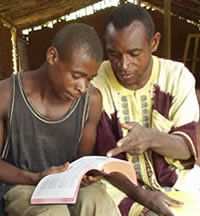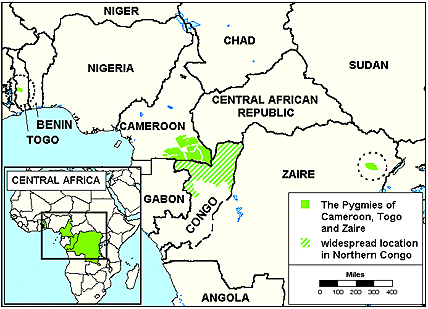The Pygmy groups have a number of things in common even though they speak separate dialects and live in various countries. They are small, perhaps because of living in the thick canopy of the African rainforest, depriving them of sunlight. There are other theories. They usually face displacement, slavery and even genocide when they come in contact with the settled Bantu peoples of sub-Saharan Africa.
One of the Pygmy groups in the Central African Republic is the Bayaka Pygmy population. They speak Yaka.
Bayaka Pygmies are usually hunter/gatherers. Like in other parts of Africa, the Bayaka Pygmies are looked down upon by other ethnic groups. This is partly because of their small stature but also because they are viewed as primitive by settled farmers and livestock herders.
On the positive side, they are known for their unique singing abilities and dance. Singing and dancing are communal ways to celebrate a successful hunt.
Men usually hunt while women gather forest produce. Because of limited resources, the Pygmies are usually nomadic. Others have settled and become subsistence farmers like their neighbors. Their way of life is being threatened by mining and logging in their forested homeland.
They tell stories to their children to maintain their traditions.
Though the Bayaka Pygmies today have a strong Christian foundation, they also have a pantheistic view of the world. Traditionally they felt linked to the forest, which itself was their god. Out of respect for this god, they would only take what they needed. If a hunt wasn t going well, they would do a ceremonial dance to chase away evil spirits.
Bayaka Pygmies need protection and a chance to learn modern skills. They are often used and abused.
Pray for the Lord to protect the Bayaka Pygmies in the Central African Republic.
Pray that the Lord will bless them physically and spiritually.
Pray for them to use their music to teach the ways of Jesus to their children.
Scripture Prayers for the Pygmy, Bayaka in Central African Republic.
https://www.pygmies.org/
https://globaldiversityhub.com/discover-the-rich-pygmy-traditions-and-culture-of-central-africa-a-journey-into-indigenous-heritage/
https://en.wikipedia.org/wiki/African_Pygmies
| Profile Source: Joshua Project |











